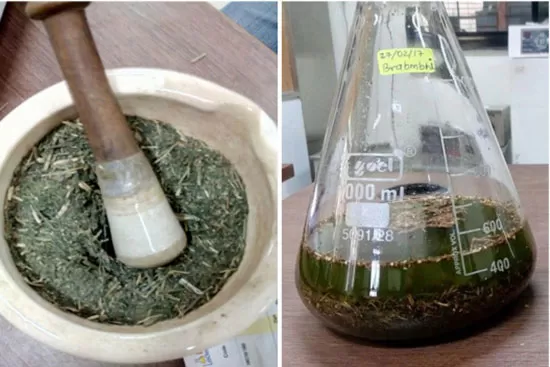- 0086-571-85302990
- sales@greenskybio.com
The Future of Allergy Relief: Integrating Grape Seed Extract, Vitamin C, and Pycnogenol into Your Health Regimen
2024-08-09

1. Introduction to Allergies
Allergies are a widespread health concern that can significantly impact an individual's quality of life. An allergy is an abnormal immune response to a foreign substance, known as an allergen. Common allergens include pollen, dust mites, certain foods, and animal dander. When an allergic person is exposed to an allergen, their immune system overreacts, triggering a cascade of symptoms such as sneezing, itching, watery eyes, and in severe cases, difficulty breathing.

2. The Role of Natural Substances in Health
In recent years, there has been a growing interest in using natural substances to support health and manage various conditions, including allergies. Natural substances are often preferred due to their potential lower side - effect profiles compared to pharmaceutical drugs. They can also work in harmony with the body's natural processes.

3. Grape Seed Extract
3.1 What is Grape Seed Extract?
Grape Seed Extract is derived from the seeds of grapes (Vitis vinifera). It is rich in polyphenols, particularly proanthocyanidins. These compounds are known for their antioxidant properties.
3.2 How Grape Seed Extract Helps with Allergies
- Anti - inflammatory Effects: Grape seed extract has been shown to have anti - inflammatory properties. In the context of allergies, inflammation is a key component of the immune response. By reducing inflammation, it may help to alleviate allergy symptoms such as nasal congestion and skin irritation.
- Immune Modulation: It can also modulate the immune system. Instead of an over - reactive immune response to allergens, grape seed extract may help the immune system to respond in a more balanced way.
3.3 Scientific Evidence for Grape Seed Extract in Allergy Relief
Several studies have investigated the role of grape seed extract in allergy management. For example, in vitro studies have demonstrated its ability to inhibit the release of histamine, a key mediator of allergic reactions. Animal studies have also shown that grape seed extract can reduce allergic inflammation in models of allergic rhinitis and asthma.

4. Vitamin C
4.1 The Importance of Vitamin C in the Body
Vitamin C, also known as ascorbic acid, is an essential nutrient for the human body. It is involved in numerous physiological processes, including collagen synthesis, wound healing, and immune function.
4.2 Vitamin C and Allergies
- Antioxidant Defense: Vitamin C is a powerful antioxidant. In the case of allergies, it can help to neutralize free radicals that are generated during the immune response. These free radicals can cause damage to cells and tissues, and by scavenging them, vitamin C may reduce the severity of allergy symptoms.
- Enhancing Immune Function: It plays a crucial role in enhancing the immune system. A well - functioning immune system is better able to recognize and respond to allergens in a more appropriate manner, rather than overreacting.
4.3 Research on Vitamin C for Allergies
Some clinical studies have suggested that vitamin C supplementation may be beneficial for individuals with allergies. For instance, a study on patients with allergic rhinitis found that those who took vitamin C supplements had a reduction in the frequency and severity of sneezing and nasal congestion.

5. Pycnogenol
5.1 Understanding Pycnogenol
Pycnogenol is a natural plant extract derived from the bark of the maritime pine (Pinus pinaster). It is a complex mixture of bioflavonoids and other phenolic compounds.
5.2 Pycnogenol's Impact on Allergies
- Anti - histamine Activity: Pycnogenol has been shown to have anti - histamine properties. Histamine is responsible for many of the classic allergy symptoms such as itching, sneezing, and watery eyes. By inhibiting histamine release and activity, pycnogenol can help to relieve these symptoms.
- Vascular Protection: It also provides vascular protection. Allergic reactions can sometimes affect the blood vessels, leading to swelling and redness. Pycnogenol's ability to protect the blood vessels may contribute to reducing the visible signs of allergies.
5.3 Scientific Support for Pycnogenol in Allergy Treatment
Multiple scientific studies have provided evidence for the effectiveness of pycnogenol in allergy relief. In human clinical trials, participants with allergic rhinitis who took pycnogenol supplements reported significant improvements in their symptoms, including a reduction in nasal congestion, itching, and sneezing.
6. Synergistic Effects of the Three Substances
When grape seed extract, vitamin C, and pycnogenol are combined in a health regimen, they may have synergistic effects in allergy relief.
- Enhanced Antioxidant Capacity: Vitamin C and the polyphenols in grape seed extract and pycnogenol work together to provide enhanced antioxidant protection. This can better combat the oxidative stress associated with allergic reactions.
- Optimal Immune Regulation: The three substances can interact to regulate the immune system more effectively. While each has its own way of modulating the immune response, together they may achieve a more balanced and optimal state, reducing the likelihood of an over - reactive immune response to allergens.
- Comprehensive Symptom Relief: Grape seed extract's anti - inflammatory effects, pycnogenol's anti - histamine activity, and vitamin C's antioxidant and immune - enhancing properties can target different aspects of allergy symptoms, providing more comprehensive relief.
7. Incorporating These Substances into Your Health Regimen
- Dietary Sources:
- Grape seed extract can be obtained from consuming grapes, especially the seeds, although in a more concentrated form, it is available as a supplement.
- Vitamin C is abundant in fruits and vegetables such as oranges, lemons, strawberries, and broccoli. However, for those with allergies, supplementation may be necessary to achieve higher therapeutic levels.
- Pycnogenol is typically taken as a supplement, as it is not easily obtained from a normal diet.
- Supplementation:
- When considering supplementation, it is important to consult with a healthcare provider. They can provide guidance on the appropriate dosage based on individual health status, age, and the severity of allergies.
- Typical dosages for grape seed extract may range from 100 - 300 mg per day, for vitamin C, doses can vary from 500 - 2000 mg per day depending on the need, and for pycnogenol, a common dosage is 50 - 150 mg per day.
8. Precautions and Considerations
- Allergic Reactions to Supplements: Although these substances are generally considered safe, there is a possibility of allergic reactions to the supplements themselves. For example, some people may be allergic to components in grape seed extract or other additives in the supplement capsules.
- Interactions with Medications: If you are taking other medications, there may be potential interactions. For instance, high - dose vitamin C can interfere with the absorption of certain drugs, so it is crucial to inform your healthcare provider about all the medications you are taking.
- Individual Variability: Everyone's body is different, and the effectiveness of these substances may vary from person to person. Some individuals may experience significant relief from allergies, while others may not notice much of a difference.
9. Conclusion
The integration of grape seed extract, vitamin C, and pycnogenol into a health regimen shows great promise for the future of allergy relief. These natural substances, with their individual and synergistic effects, offer a potential alternative or complementary approach to managing allergies. However, more research is still needed to fully understand their long - term effectiveness, optimal dosages, and potential interactions. By working with healthcare providers and being aware of the precautions, individuals with allergies can explore these natural options as part of their overall strategy to improve their quality of life.
FAQ:
What is grape seed extract and how can it help with allergies?
Grape seed extract is rich in antioxidants such as proanthocyanidins. These antioxidants can help reduce inflammation in the body. In the context of allergies, inflammation is a key factor contributing to symptoms like itching, swelling, and redness. By reducing inflammation, grape seed extract may alleviate some of these allergic symptoms.
How does vitamin C contribute to allergy relief?
Vitamin C is well - known for its immune - boosting properties. It can enhance the function of the immune system, which is important in dealing with allergens. Additionally, it has anti - inflammatory effects. For people with allergies, vitamin C may help the body better tolerate allergenic substances and reduce the severity of allergic reactions.
What is pycnogenol and what role does it play in combating allergies?
Pycnogenol is a plant extract. It has anti - inflammatory and antioxidant properties. In terms of allergies, it can modulate the immune response, reducing the over - reaction of the immune system to allergens. This helps to decrease allergy symptoms such as sneezing, runny nose, and itchy eyes.
How do grape seed extract, vitamin C, and pycnogenol work synergistically for allergy relief?
Grape seed extract and pycnogenol both have strong antioxidant and anti - inflammatory effects. Vitamin C also has anti - inflammatory properties and boosts the immune system. Together, they can enhance the overall anti - inflammatory response in the body. They may also work together to better regulate the immune system's reaction to allergens, providing more comprehensive relief from allergy symptoms compared to using each substance alone.
Is there scientific evidence to support the effectiveness of these substances for allergy relief?
Yes, there is scientific research on the effectiveness of these substances. For example, some studies have shown that grape seed extract can reduce inflammation markers in the body related to allergic reactions. Vitamin C has been studied for its role in immune function and its potential to reduce allergy symptoms. Regarding pycnogenol, research has indicated its ability to modulate the immune response in relation to allergies. However, more research is still needed to fully understand their combined and individual effects on different types of allergies.
Related literature
- The Role of Grape Seed Extract in Health and Disease"
- "Vitamin C: Functions and its Role in Allergic Reactions"
- "Pycnogenol: A Review of its Anti - Allergic Properties"
- ▶ Hesperidin
- ▶ citrus bioflavonoids
- ▶ plant extract
- ▶ lycopene
- ▶ Diosmin
- ▶ Grape seed extract
- ▶ Sea buckthorn Juice Powder
- ▶ Beetroot powder
- ▶ Hops Extract
- ▶ Artichoke Extract
- ▶ Reishi mushroom extract
- ▶ Astaxanthin
- ▶ Green Tea Extract
- ▶ Curcumin Extract
- ▶ Horse Chestnut Extract
- ▶ Other Problems
- ▶ Boswellia Serrata Extract
- ▶ Resveratrol Extract
- ▶ Marigold Extract
- ▶ Grape Leaf Extract
- ▶ blog3
- ▶ blog4
- ▶ blog5
-
What are extracts made of?
2024-08-09
-
Extract Usage: A Comprehensive Guide
2024-08-09
-
Are plant extracts good for you?
2024-08-09
-
What are plant-based extracts?
2024-08-09
-
What Is a Plant Extract? A Deep Dive
2024-08-09
-
Aguaje Extract
2024-08-09
-
Acerola Juice Powder
2024-08-09
-
Epimedium extract powder
2024-08-09
-
Aminolevulinic acid
2024-08-09
-
Ginseng Root Extract
2024-08-09
-
Chasteberry Extract
2024-08-09
-
Mangosteen extract powder
2024-08-09
-
Chaste Berry Extract
2024-08-09
-
Bayberry Extract
2024-08-09
-
Lemon Extract
2024-08-09































